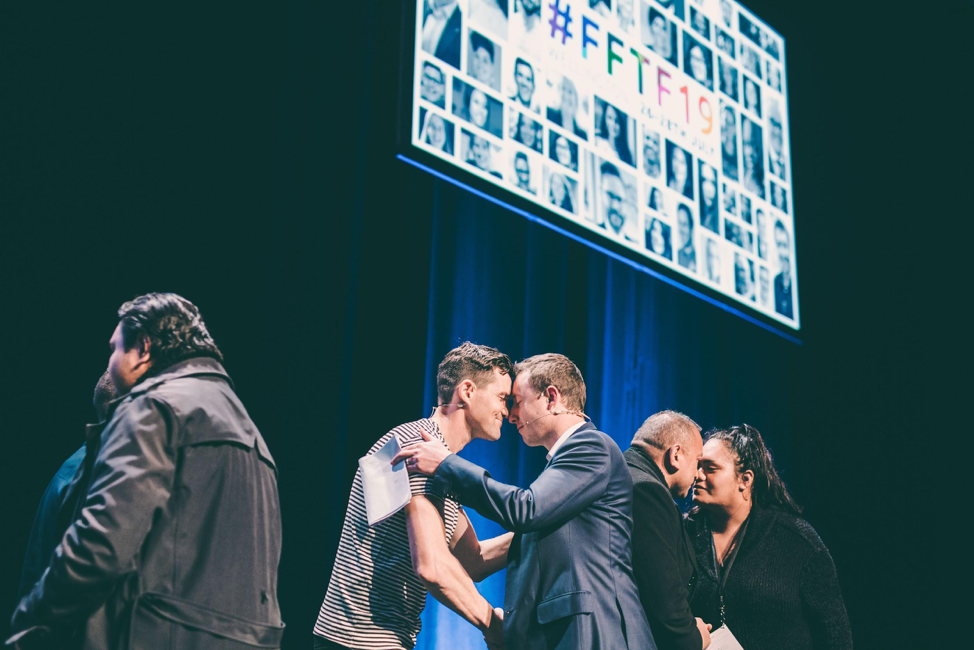
 Fast forward two years and more than 1,200 people listen as Swarbrick’s name echoes through TSB arena at the ninth Festival for the Future. She’s not speaking, I don’t think she even came, but her name comes up everywhere I turn.
Fast forward two years and more than 1,200 people listen as Swarbrick’s name echoes through TSB arena at the ninth Festival for the Future. She’s not speaking, I don’t think she even came, but her name comes up everywhere I turn.
“Chlöe is a pretty compelling example of a young person, a very talented young person, who cared strongly enough that she was willing to break the mould and take things into her own hands,” said Inspiring Stories CEO, Guy Ryan.
“In many ways that’s the spirit we cultivate at Festival for the Future. A place where leaders, whether they are in politics, business, social movements, or otherwise, are inspired to create real change and show what’s possible”
Festival for the Future is a youthtopia. People are smiling, crying, and speaking freely. Spontaneous haka are frequent and heartfelt. Hundreds of school kids have given up their weekends to be there and no one seems too concerned with the All Blacks game taking place a couple of blocks away.
The event is broken up between the mainstage for the keynote presentations, a marketplace filled with a myriad of booths touting social enterprises and education opportunities, and “break out” areas, where workshops of many shapes and forms are hosted.
I arrive in time for the first speech from Wellington’s mayor, Justin Lester, who doubles as the city’s youngest councillor.
Forty years old but dressed more like a mildly hip 20 year old in a striped T-shirt and tight jeans, Lester speaks of the inspiration for his journey into politics. He and his brother were raised by his widowed mother, while his family made ends meet from the small government beneficiary she received. At a young age he listened as politicians on TV berated people like his mother as ‘dole bludgers’ and from there vowed to join politics so he could stand up against these kinds of dangerous messages.

His closing statement was one that would resonate through many presentations and conversations over the course of the weekend.
“We need your voice, we need your support. We need you to shout out, find your inner spark and be the people you want to be,” said Lester.
For many, surprisingly, that meant joining Lester’s ranks in local governments around the country, an area where young people have been traditionally underrepresented both in voter turnout and seats at the table.
In a survey of 253 festival attendees, 53 responded that they would be running for local council. The event gave some practical tips to make that dream a reality, too. Five minutes walk from the main stage and I’m sitting in a workshop aptly named how to effect change in the upcoming local body elections, hosted by Wellington’s Deputy Mayor, Jill Day, and Rotorua councillor Tania Tapsell. Attendees as young as 16 feverishly scribbled notes as the two councillors broke down the job description, tips for campaigning, and things to look out for once you’re elected. “Understand your key messages, make sure they’re appealing to all ages, and drive them home” said Tapsell. “You’re going to be held to account on your campaign messages, so these need to be very clear.”
 Sophie Handford, who was presenting back on mainstage, has quickly gained national notoriety as the country’s most impassioned young climate warrior, and more recently as a candidate for Wellington City Council. As the New Zealand coordinator for School Strike 4 Climate, she helped organise thousands of kids around Aotearoa to wag school in an international protest against political and economic inaction against climate change.
Sophie Handford, who was presenting back on mainstage, has quickly gained national notoriety as the country’s most impassioned young climate warrior, and more recently as a candidate for Wellington City Council. As the New Zealand coordinator for School Strike 4 Climate, she helped organise thousands of kids around Aotearoa to wag school in an international protest against political and economic inaction against climate change.
“I care because it’s too important not to,” said Handford “Together we need to change what ‘business as usual’ looks like, which means we need to do the seemingly impossible and change the rules to create the future we want.”
Sophie was also a nominee, and an eventual winner, in the climate category of The Impact Awards, which took place smack bang in the middle of the festival weekend. The glitzy inaugural Impact Awards, fit with white table cloths and a fine selection of mocktails, was an opportunity to celebrate young New Zealanders leading the way in climate, enterprise, inclusion, and wellbeing.
Tuapapa Maori Language Academy and Consultancy founder and director Shaquille Shortland won the Inclusion category. The organisation is a kaupapa M?ori driven social enterprise dedicated to education in Te Ao M?ori, social development and youth leadership.
Te Whare Hukahuka co-founder Shay Wright was awarded the Enterprise category for the group’s work to positively impact the lives of indigenous people. Te Whare Hukahuka aims to prove businesses can be owned and managed by native communities, while also creating positive social outcomes and respecting the environment and enhancing New Zealand’s culture.
From the young people receiving these awards, to chat with kids that gave up their weekend to be there, the consistent takeaway I had from the Festival for the Future is that the upcoming crop of Kiwis not only care, but are willing to do something about it. Spanning cool new business ideas, environmental initiatives, and surely the most politically empowered group we’ve seen, the festival is an optimistic cross section of New Zealand’s impassioned youth, and a vision into a possible future where big problems like climate change are met with pragmatism.




